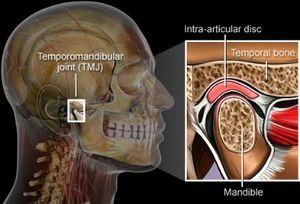How are TMJ disorders caused?
The exact cause of the disorder is unknown. Some factors are related to an improper bite, injury, arthritis, severe stress, or a combination of factors. Clenching or grinding teeth, a condition called bruxism, may develop from stress or as part of a sleep disorder.
This can tire muscles and create painful spasms, causing even more pain. Repeated muscle problems may affect the joints, resulting in tissue damage, muscle tenderness, and more spasm, perpetuating a cycle of pain.
What are the symptoms of TMJ disorder?
- Jaw pain or soreness, more noticeable in the morning or afternoon
- Jaw pain while chewing, biting, or yawning
- Earache without an infection, sometimes spreading into the face
- Soreness in front of the ear
- A clicking or grinding noise while opening and closing your mouth
- Difficulty opening and closing your mouth
- A stiff jaw when eating, talking, or yawning
- Sensitive teeth without any signs of dental problems
- Aching on the side of the head and neck pain
- A burning sensation in the mouth/tongue
- Grinding of your teeth
- Restricted range of jaw movement or "locking" of the jaw in an open or closed position
A thorough dental examination is the first step toward finding a solution. Depending on the diagnosis, treatments may include reshaping teeth, bite guards, and muscle relaxants.
What TMJ disorder treatments are available?
Proper diagnosis is critical to make sure you receive treatment for your particular condition. At Kneib Dentistry we will only recommend treatment after conducting a thorough health history, clinical exam, taking appropriate X-rays, and perhaps confirming the condition through other diagnostic tests.
At Kneib Dentistry we may prescribe a multiple-phase treatment plan. Only minor corrective treatment may be needed. Treatment may be simple or require more steps for alleviating the condition, depending on the degree of severity. Some of these treatments include:

- NTI Appliance
- Taking a non-aspirin pain reliever or prescription medications such as muscle relaxants, analgesics, or anti-inflammatory drugs
- Eating soft foods
- Avoiding chewing gum
- Applying moist heat or ice
- Physical therapy
- Teaching relaxation techniques to control muscle tension
- Stress management training techniques
- Posture training
- Wearing bite plates to eliminate the harmful effects of clenching or grinding the teeth and a better positioning of the jaws
- Adjusting the bite, known as "occlusal equilibration" involving removing interferences when the teeth touch
- Replacement of defective restorations that prevent the jaws from meeting properly
- Orthodontics, to put the teeth in proper position
- TENS Unit Therapy
- Surgery
In most cases we treat at Kneib Dentistry, the symptoms related to TMJ disorders can be successfully treated to reduce or eliminate your discomfort. Postponement of treatment usually results in more damage to the joint, muscles, or teeth.
Dental Treatment FAQs
What is TMJ (temporomandibular joint dysfunction)?
Temporomandibular Joint Disorder, also known as TMJ, is a type of disorder that can cause pain in the joints and muscles in your jaw that control movement.
Symptoms of TMJ disorders vary depending on their severity but may include pain in one or both jaws when chewing, closing your mouth, touching your chin to your chest, or rubbing your chin against your shoulder. When you have a TMJ disorder, you can experience serious pain in the muscles and joints of your jaw.
Does TMJ go away?
Can TMJ cause dizziness?
Can braces fix TMJ?
Is TMJ hereditary?
What is the difference between TMD and TMJ?

